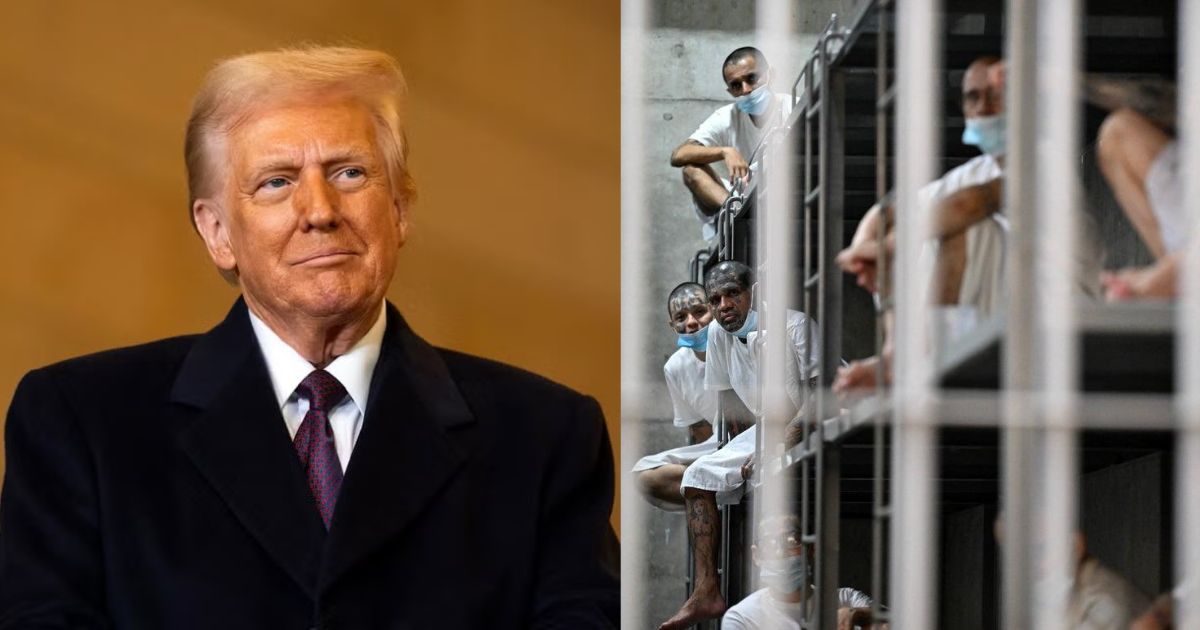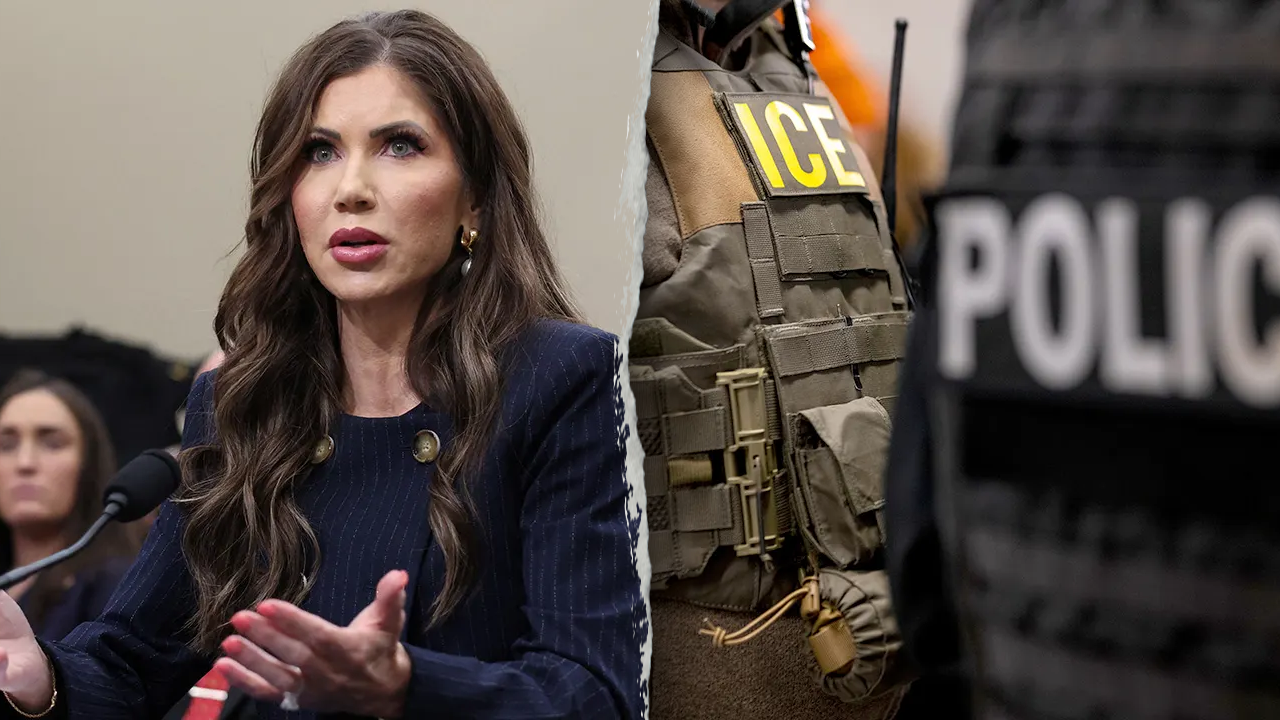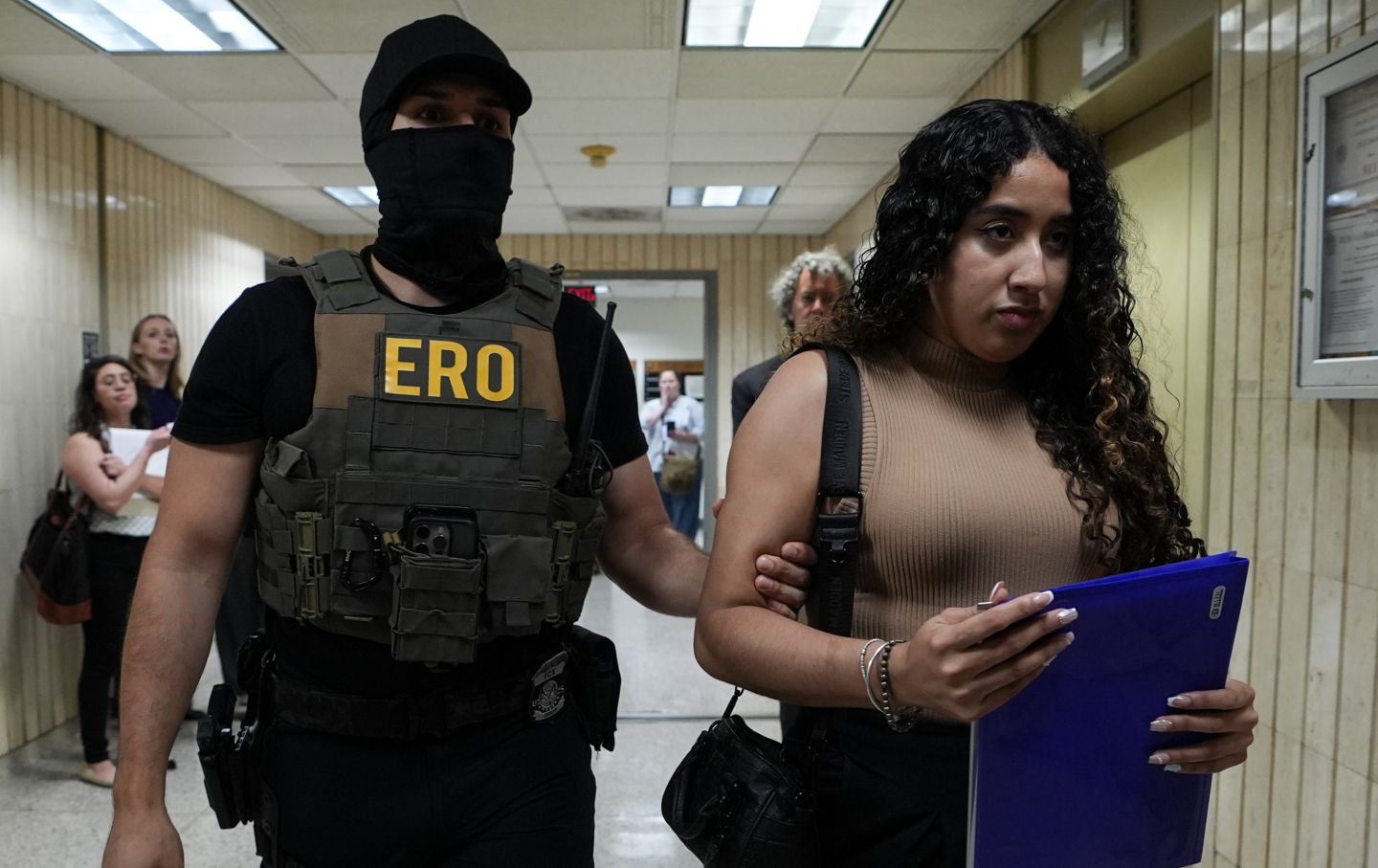Joselyn Chipantiza-Sisalema, 20, dressed in a red shirt and blue jeans on a Tuesday morning in June and took the subway from Bushwick to Lower Manhattan. She walked into the Jacob Javits Federal building at 26 Federal Plaza, a few blocks north of City Hall, took her keys and phone out of her pockets to pass through security, and got in an elevator up to the 12th-floor courtroom of Judge Donald Thompson. Like the vast majority of people appearing in immigration court, she had no lawyer with her. Chipantiza-Sisalema’s parents and younger brother had made the brutal journey from Ecuador to the United States in 2022, part of an increasing number of Ecuadorans propelled north as their country destabilized. They settled in New York—where a large Ecuadoran population has been part of the city since the 1970s—and filed a claim for asylum. Chipantiza-Sisalema joined her parents last year, crossing into the US at El Paso in May 2024. In the volatile political climate in Ecuador, she had faced threats and stalking, her father later told reporters. Immigration officials in El Paso determined Chipantiza-Sisalema was not a flight risk or a danger to the community, so she was permitted to go on to New York to her family and told to appear in court more than a year later. She followed the rules.
The June 24 hearing at 26 Federal Plaza was her first immigration hearing. It was brief. Judge Thompson scheduled her next date for March 2026. But when Chipantiza-Sisalema stepped out of the courtroom to return home, masked men grabbed her. She was hustled down to the 10th floor of the courthouse. She would remain there for nine days—without being charged or ever given the opportunity to contest her detention, without access to an attorney, sleeping on the floor, with minimal food and nowhere to bathe. In hasty one-minute phone calls, Chipantiza-Sisalema told her parents there were at least 70 other people there. The small number of holding cells in the federal building are meant to be used just for a few hours before someone is transferred to a different facility, attorneys familiar with the building explained. There is no provision for meals and no beds. When she was put on a plane and transferred to the for-profit Richwood Detention facility in Louisiana on the Fourth of July—before a New York judge had a chance to review the habeas corpus petition an attorney filed the day before—she was still wearing that same red shirt and blue jeans.
The overwhelming majority of immigrants whose cases are winding through the immigration court system show up for their hearings, believing that by adhering to the system’s labyrinthine requirements they’ll be rewarded with clearance to stay in the country. Or at least the chance to fight another day. But under President Donald Trump’s aggressive deportation regime, abiding by the immigration system’s rules has become increasingly dangerous. Those who show up in court now routinely face arrest. But failure to appear for a hearing generally triggers a deportation order, attorneys explained. Immigrants, advocates, and elected officials at all levels are scrambling to confront what they say is lawlessness inside the courthouse and throughout the ICE detention system. “ICE is just detaining everyone and giving only some a right to a hearing, and it’s only the possibility of having a lawyer who will shout and scream for you that your case is heard,” said Melissa Chua, an attorney at the pro bono New York Legal Assistance Group, who is representing several people who, despite following US immigration procedure, are now in detention.
Chipantiza-Sisalema is just one of hundreds of people taken in the past month by masked ICE agents at Manhattan’s immigration courts, Harold Solis, co–legal director for the Brooklyn-based immigrant rights group Make the Road New York, told The Nation. “The truth is, I don’t think anyone has a full scope of how many people have been held there.” Make the Road is now representing Chipantiza-Sisalema. Similar scenes have played out in courthouses across the country, with immigrants often shuttled between several facilities before their family or attorney can locate them. Beginning in April, it appeared to court observers in Manhattan that ICE was lying in wait for people whose cases were dismissed or who were ordered to be deported. Veteran attorneys say courthouse arrests had previously been extremely unusual. “In all my years of practice, it has never been a fact of life that going to immigration court leads to you being detained,” Solis said. By late June, ICE was routinely taking people even when, like Chipantiza-Sisalema, US immigration judges had ordered them to reappear several months in the future.
“People are being disappeared into this hole of 26 Federal Plaza for a prolonged period of time and in deplorable conditions,” said Kendal Nystedt, an attorney at the rights group Unlocal whose client was held there for six days. The New York Immigration Coalition is representing someone held for three weeks, executive director Murad Awawdeh said. The vast majority, maybe as many as 99 percent, according to a close court watcher who asked not to be identified because of the nature of her work, do not have an attorney.
“If you’re someone without a family member or no one has alerted us to you, there is no way for us to know what has happened,” said Chua. “They are really creating this shadow place that can deny people protections they are afforded by our Constitution.”
In the chaotic seconds as immigrants exit courtrooms, volunteer observers hastily attempt to catch people’s names, alien registration numbers, and contacts for family members before ICE strongarms them into elevators and out of sight. The hope is that by collecting people’s names, their families will be able to find out where they are sent. A diffuse mutual aid network raises commissary funds, tries to connect people to counsel, and offers support to families left behind—often without a breadwinner. Ordinarily when someone is detained, they show up in the ICE detainee locator in a mattered of hours, attorneys said. But those held at 26 Federal Plaza and in irregular detention in courthouses elsewhere are listed only as “in transit” for the days-long duration of their stay. In this limbo state, their lawyers and families can’t reach them.
Chua and other attorneys emphasized that the spectacle of ICE sweeping people up in courthouses was a dramatic departure from norms—even in an immigration system hardly characterized by transparency or compassion. Several members of New York’s congressional delegation, including Representatives Adriano Espaillat, Daniel Goldman, Jerrold Nadler, and Nydia Velasquez, have tried to find out how many people are held at 26 Federal Plaza—and to assess conditions. They’ve all been rebuffed.
In a surreal, Kakfaesque incident, Bill Joyce, deputy director of the New York ICE field office, told Representatives Goldman and Nadler in June that the 10th floor of 26 Federal Plaza—where a shifting number of immigrants are held against their will for days on end—is not a detention facility. Rather, it is a place ICE is “housing [immigrants] until they can be detained.” Members of Congress have a right to inspect places where people are detained, but not, Joyce argued, a place they are merely “held.” On July 14, Espaillat and Velasquez were again prevented from inspecting the facility. The lawmakers are considering legal action against the Department of Homeland Security for preventing them from exercising their oversight rights, Espaillat said.
That people are held within a courthouse in a sanctuary city that considers itself the capital of immigrant America is an affront that has New York lawmakers searching for solutions. “We’re fighting this from the legal front and the budgeting front and the legislative front. And we’re fighting this in public opinion,” Espaillat said. Likewise, New York City Public Advocate Jumaane Williams said his office is seeking litigation in support and praised the efforts of court observers. A coalition of immigrants rights groups in Washington, DC, filed a class action suit in federal district court in DC on July 17, alleging that the courthouse arrests are a violation of due process. New York groups could soon follow.
While ICE is barred by state law from entering New York criminal and civil courts, 26 Federal Plaza is under federal jurisdiction. But standing beside Chipantiza-Sisalema’s bereft and terrified parents at a July 3 press conference, several elected officials called on New York Governor Kathy Hochul to find a way to intervene. Assemblywoman Emily Gallagher, who represents parts of Brooklyn, thinks lawmakers, whose session ended mid-June, should return to Albany. “I also call on my governor, Kathy Hochul, to pass New York for All and to call us to a special session and get ICE out of our courts,” she said, referring to a bill that would extend some sanctuary protections to immigrants across New York State. Espaillat introduced HR 4176—The No Secret Police Act—in June. In the unlikely event it passes the Republican-controlled Congress, it would bar federal law enforcement officers from wearing masks or hiding their badges except in specific undercover instances. Last week, New York Attorney General Leticia James and a coalition of 20 attorneys general urged Congress to pass the bill and a bundle of similar legislation.
Closer to home, the New York City budget adopted at the end of June increased city funding for pro bono immigration lawyers by $76 million to $120 million in total, and the city’s law department filed amicus briefs in support of two detained New Yorkers this spring. But the New York Immigration Coalition wants to see a full right to counsel extended to immigration court. The rollout of city-funded right-to-counsel in housing court several years ago was not without complications, but it dramatically rebalanced the scale between tenants and landlords and has been copied elsewhere. New York wouldn’t be the first place to guarantee a right to an immigration lawyer. Oregon adopted universal access to representation in most immigration matters in 2022, said Isa Peña, director of strategy for Innovation Law Lab, based in Portland.
As courthouse arrests pile up, lawyers who are able to identify people being held are filing habeas corpus petitions in federal district courts, in hopes of keeping their clients from being transferred to distant detention facilities or deported—but also simply to compel the government to reveal where they are, dispelling the twilight status of being in perpetual “transit.” These petitions have the advantage of being heard by judges who are part of the federal judiciary—and perhaps more attuned to the rule of law than immigration court judges, who serve at the pleasure of the Department of Homeland Security.
In Buffalo, in a case since joined by the New York Civil Liberties Union, the Prisoners Legal Service is arguing that ICE’s aggressive presence in the halls of federal courthouses constitutes not just an escalation of Trump’s war on immigrants but a systematic attempt to deprive people of their due-process rights. “It’s a huge deviation in ICE tactics and unlawful in various ways,” said NYCLU attorney Amy Louise Belscher, who is representing Oliver Mata Velasquez in a habeas case. Mata Velasquez, 19, came to the United States from Venezuela in September 2024, using the CBPOne app the Biden administration required of asylum seekers.As with Chipantiza-Sisalema, immigration officials at the border determined Mata Velasquez was not a flight risk or a danger and permitted him to enter the country. He obtained work authorization and showed up May 21 for his first immigration hearing, as instructed. A judge told him to return in February 2026, but before he could leave the courthouse, ICE arrested him. Last week a judge ordered Mata Velasquez immediately released and forbade ICE from detaining him again without permission from the judge.
“Federal judges are finding these courthouse arrests unlawful,” Belscher said. “They are detaining people not because they are at risk of flight or a danger to the community, but because they are easy to find.” The NYCLU’s arguments for Mata Velasquez cite a bundle of cases successfully argued in Oregon, by the Innovation Law Lab. Those cases, named for ICE Seattle field office director Drew Bostock, argue that the courthouse arrests violate the immigrant’s right to due process. That such a violation is occurring precisely in the place one goes to seek justice has scandalized attorneys. “When we saw that people were targeted at the courthouse—where your fundamental freedoms are supposed to be upheld, we moved quickly to intervene,” Innovation Law Lab’s Peña said.
Some of the habeas petitions filed in New York last month resulted in judges’ issuing emergency orders to keep the person nearby, preventing ICE from venue shopping by sending the person to Texas or Louisiana.
People aren’t only being taken at court. Milton Maisel Perez y Perez, a teacher who fled his native Guatemala because of threats from gangs, has been in immigration proceedings for six years. Like hundreds of thousands of immigrants across the country, he gained the right to work legally and was required to check in periodically under the Department of Homeland Security’s Intensive Supervision Appearance Program (ISAP). Last month, he went to the ISAP facility in Jamaica, Queens. It was perhaps the 50th time he’d done so, his attorney S. Michael Musa-Obregon said. This time, Perez y Perez was arrested. He was transferred to the 10th floor of 26 Federal Plaza and held for three days. After Musa-Obregon filed a habeas petition with the Southern District of New York, but before it could be heard by a judge, ICE prepared to move Perez y Perez to detention—clear across the country in Seattle. A judge’s order at the last minute had him removed from the plane and transferred to detention in Goshen, New York.
The courthouse arrests are a cynical campaign, Musa-Obregon said. “They are detaining people with the idea that it is much easier to get people to give up their rights when they are incarcerated,” he said. On the Fourth of July, Trump signed into law his massive spending bill, which included $170 billion for immigration enforcement and border security. It makes ICE the largest law enforcement entity in the country and promises to vastly expand the for-profit immigrant detention system. The masked men in the halls of justice are just the beginning. But the ancient writ of habeas corpus appears to be working.
District Judge Analisa Torres ruled on Chipantiza-Sisalema’s habeas petition on July 13, ordering her immediate release. The manner of her arrest, the judge wrote, “offends the ordered system of liberty that is the pillar of the Fifth Amendment.” She was back in her parents’ arms on July 16. Snatched by masked men and held for three weeks, she’s one of the lucky ones.









